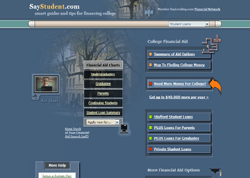Reviewing Those Calendar of Events
Reviewing Those Calendar of Events
Fall semester is just around the corner. It's only a matter of weeks before students head off to begin classes for a new academic year. July and August are key months for getting things ready such as moving, budgeting your monthly spend, arranging transportation, and closing the gap between the cost of education and the financial aid you received.
(Note: private student loans can be used to close the financial aid gap between the full cost of education and the amount of financial aid received)
Key calendar of events for July and August:
- Tuition Statements are Coming in the Mail
colleges will be sending their tuition bills to students who will be starting classes in the Fall. These tuition statements may include housing and other related fees that are generally due on the first day of class. The tuition statements will be reduced by the amount of aid awarded to the student by the college. - College Financial Aid Packages Finalized
almost all aid awards from colleges have been finalized for the Fall semester. Any cost less than the amount awarded is up to the student and their family. You can appeal the awards for more financial aid, but the chance of amending the college's decision is minimal at this calendar time. - Most Scholarships Have Been Awarded
almost all scholarship awards for the Fall semester have been made and finalized. Any new scholarships will be applied for the following semester or academic year. You might find some private scholarship money that may be available, but the amounts may be minimal. - Students (and Parents) Scrambling to Find Aid
many students are scrambling to find additional funding to start college. Once aid packages have been finalized, any gap between the cost and aid awarded is now up to the student to pay. The gap could be in the thousands for many students. - Managing Student Funds
college costs include tuition, housing, food, books, supplies, transportation, computer, recreation, and other related education costs. Costs will vary month-by-month. Students need to understand budgeting techniques to avoid running out of money before school ends.
Items on your "to-do" list for July and August include:
- Estimate How Much Additional Funds You Need
students (and parents) need to do a quick calculation to estimate what additional funds will be needed to start school. The calculation will include all the available aid sources that have been awarded
minus
the estimated cost of education such as tuition and fees, books, supplies, housing, food, transportation, computer, recreation, and other related expenses. The difference if any, will include the additional amount the student may find to pay for a full year of college. - Get the Extra Money You Need
students can use private student loans to instantly borrow up to $40,000 (1) to pay tuition, housing, computer, and other related college expenses. You will make no payments until after graduation. (2) Money is sent directly to the student in as little as 5 business days.
The benefits of private student loans include:
- quick processing —
the SayStudent private student loan can be funded in as few as 5 business days from receipt of completed application. This is a great benefit for students who need to make tuition payments deadlines.- you control the money —
private student loan funds are disbursed directly to you, not the school. Use the money to pay tuition, housing, books, a computer for classroom assignments, and other education related expenses.- borrow enough to cover your costs —
with private student loans, you can borrow annually up to $30,000 (or up to $40,000 for certain schools where it has been determined that the annual cost of attendance exceeds $30,000): see footnote below- loan amounts not tied to federal limits —
you can borrow up to the full cost of education or $40,000, whichever is less. It doesn't matter how much aid you have previously received or expect to receive from the federal government or college.- no payments until after you graduate —
you don't need to worry about making any payments on your private student loan until after you graduate or leave school. So you can focus your entire work on getting your degree.- easy, no hassle application —
you can submit your private student loan online or speak with our professional loan advisor about your needs and getting qualified. Dial: 1-866-230-4578
- Setup a College Budget
only borrow what you need. Parent and student should establish a budget plan for monthly spending allowances to borrow only what they need for the school years without running out of money, - Manage Those Student Funds
students will be tempted to over spend, especially with student credit cards that will be offered to new college students. Avoid getting into debt by using pre-paid credit cards instead to manage college spend: - How Parents Can Help
parents can be a big help with helping their student through college without going into debt. First, they can co-sign their student's private student loan application. The student can then use the private student loan to pay education costs.
Second, the parent can use their Banker Line of Credit program to make payments on the private student loan while the student is attending college. Following graduation, the student assumes payment responsibility on the loan after they start their new career.
For more information:
about private student loans to help close the gap
about the Banker Line of Credit

